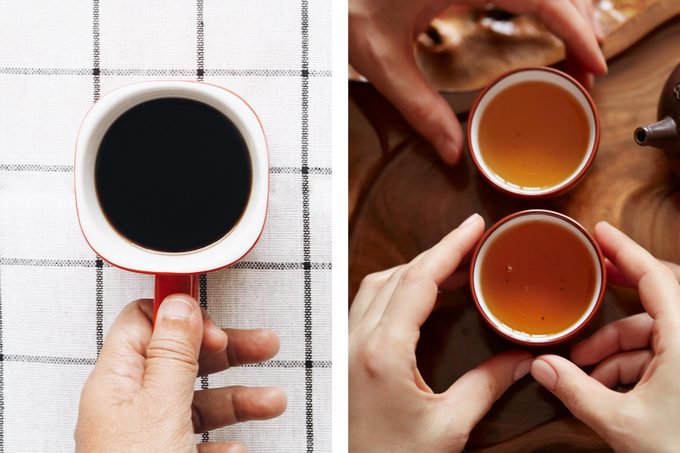Coffee vs. Tea: Which One Is Better for You?
Both beverages have a legion of loyal drinkers, but is one group edging out the other in terms of health benefits?

Both coffee and tea are brimming with ingredients that are beneficial to the body in their own ways, but the dynamic interaction between them may be what’s of greatest benefit to you. So does one rank as more virtuous than the other? Read on to find out.
What’s good about coffee?
“Coffee has been linked to decreased risk of Parkinson’s disease and type 2 diabetes,” says Kimberly Gomer, MS, RD, LDN, director of nutrition at the Pritikin Longevity Center & Spa in Miami.
It’s also been shown to lower the risk of some cancers, including endometrial cancer and non-melanoma skin cancer. A study of more than 500,000 people across the world concluded that coffee drinking was associated with reduced risk of death from various causes. This was even true in people who drank as many as eight cups per day!
Just don’t load up your morning joe with sugar and cream or you may erase the good benefits entirely. These signs suggest you may be drinking too much coffee.
What’s good about tea?
“Tea and green tea, both caffeinated and decaffeinated, contain ingredients that have many health benefits including reduced risk of cancer, cardiovascular disease, osteoporosis, and gum disease,” Gomer says.
Those ingredients include antioxidants and polyphenols, compounds that may also help lower blood pressure, reduce cognitive decline, lower your stroke risk, and improve weight loss.
What’s more, research shows that regular tea drinkers have less inflammation, perhaps thanks to a compound called epigallocatechin gallate (EGCG). Inflammation is connected to many medical conditions, from arthritis to heart disease. EGCG could lower the risk of plaque formations in the brain that are associated with Alzheimer’s disease.
Which is better?
Tea gets the leg up for one reason only: the plethora of powerful antioxidants and polyphenols. Yes, coffee has them, too, but tea often has them in higher concentrations.
“Coffee and tea both have their benefits, but all tea contains antibacterial, anti-inflammatory, and antiviral benefits due to its polyphenol and antioxidant content,” says Will Cole, IFMCP, DC, a functional-medicine expert and author of Ketotarian. “Additionally, different types of tea offer their own unique benefits.”
Of course, if you are sensitive to caffeine, you may need to avoid both. Coffee has more than tea—about 92 milligrams per cup—but tea still racks up about 50 milligrams.
“The caffeine in either may pose an issue to those sensitive to it, such as tremors, increased anxiousness, or disruption in sleep,” says Beth Warren, MS, RDN, CDN, founder of Beth Warren Nutrition and author of Secrets of a Kosher Girl.
But if you find yourself in the camp of people who drink both regularly, even better. Research suggests that people who drink a combination of coffee and tea daily have a lower risk of death compared to people who drink coffee exclusively. Thinking of switching your brew of choice? Try our Uncoffee: A caffeine-free bevvy.




